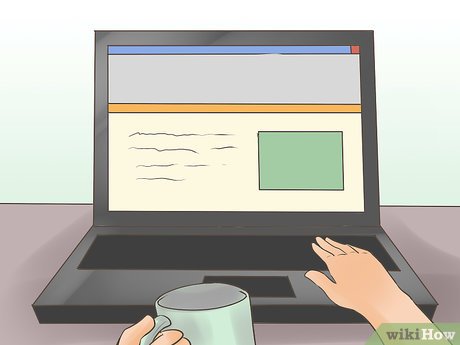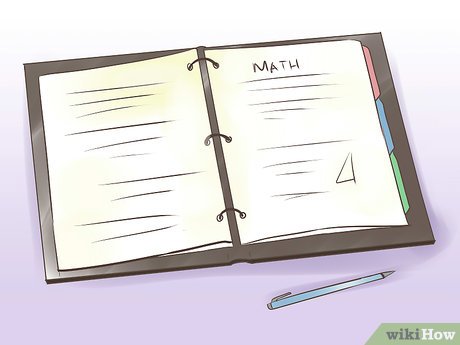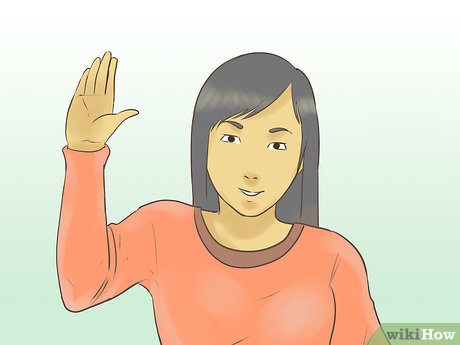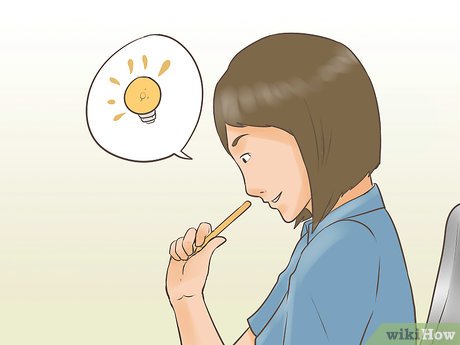How to Improve Math Skills
Honing Your Math Brain
-
 Play math games. Math games are good tools for honing your math skills and are designed to let you have fun while doing it. Some recommended online math games (that are in line with the new Common Core standards) include:
Play math games. Math games are good tools for honing your math skills and are designed to let you have fun while doing it. Some recommended online math games (that are in line with the new Common Core standards) include:- DragonBox 5+ which lets you gradually build your algebra skills until you're able to master more and more advanced equations.[1]
- Prodigy, a game targeted at elementary-school students, that integrates math practice into a role-playing game that allows players to use math to make their way through an appealing fantasy world.[2]
- Many other productive games are available online and as apps, so do a little looking around and find those best suited to your needs and goals.
-
 Make math part of your life. Incorporate math equations into your daily routine to help keep your skills sharp and to help you recognize the many ways that math exists all around you.[3]
Make math part of your life. Incorporate math equations into your daily routine to help keep your skills sharp and to help you recognize the many ways that math exists all around you.[3]- Take the time to apply math in common situations. For example, if, say, a sweater that's regularly $38 is on sale for 30% off, what is the sale price? Or if you need to double a recipe that calls for 3/4 cup of flour, how much flour will you need?
- Also take the opportunity to put your math skills to work in new and different situations outside your normal routine. For example, if you plan to hike a new trail that's 7 miles long and it takes you 20 minutes to walk a mile, how long should you plan for your hike to take? Or if you need to drive 13 miles to pick up your friend at 1:30 and the average speed limit there is 45 mph (72 km/h), what time will you need to leave to arrive on time to get your friend?
-
 Learn about the big picture. It's easy to become frustrated with math when all you're doing is memorizing a formula that, at base, means nothing to you. But if you work to truly understand the principles behind the formula, your understanding of math can become deeper and more productive.[4]
Learn about the big picture. It's easy to become frustrated with math when all you're doing is memorizing a formula that, at base, means nothing to you. But if you work to truly understand the principles behind the formula, your understanding of math can become deeper and more productive.[4]- Start by doing some research. Say you're learning the Pythagorean theorem. Who was Pythagoras anyway? What does he have to do with triangles? How did he discover the theorem that was named after him and why does anybody care? Having a sense of the development and broader implications of a math concept can turn it from something you simply have to memorize into something you genuinely understand and can take an interest in.
- Translate the math principle into everyday language. Staying with the Pythagorean theorem, you know that the basic definition of the Pythagorean theorem is a2 + b2 = c2, but what does that translate to in everyday language? Try to figure it out. Translating it might result, for example, in this: the square of the longest side of a triangle (c2) is the same as (or equal to) the squares of the other two sides (a2 + b2) added together. Translating the principle into everyday, non-intimidating language can help you more easily understand, remember, and apply that principle.
- Explore with that new principle--in the Pythagorean theorem example, try applying the theorem to other shapes than triangles. Can it be translated and applied to other shapes like rectangles, hexagons, squares, etc.? Why or why not? Understanding why a principle specifically applies to some instances and not others will help you better integrate and apply that principle as you go forward.
0 / 0
Part 1 Quiz
How can researching history help hone your math brain?
Not necessarily! Of course, you might find it interesting to compare the type of math we use today to what the Egyptians used when building the pyramids. Still, this is one element of a larger, umbrella-like approach to math. Try another answer...
Try again! Of course, looking at history through a lens is always interesting, but there are ways to approach specific elements of history that will hopefully get you excited about practicing math. Choose another answer!
Correct! If you find out research on how equations came about, when they changed, if they were accepted at the time, etc, it puts math -- equations, theorems, etc., -- into the broader context of history and makes it exciting and interesting. Math becomes a tool of innovation and change, and you will now be able to look at it as a part of something much larger. Read on for another quiz question.
Nope! There are many different ways to approach a subject. If you struggle with math and science but excel at humanities, you can use that interest to help make math more exciting and accessible! Guess again!
Want more quizzes?
Keep testing yourself!Preparing for Class
-
 Set up a well-organized binder or notebook. Designate a separate binder or notebook specifically for math class (one binder or notebook per class if you're taking multiple math classes).
Set up a well-organized binder or notebook. Designate a separate binder or notebook specifically for math class (one binder or notebook per class if you're taking multiple math classes).- Set up a section for in-class notes, a section for reading notes, and a section for homework.
-
 Schedule study time. Set aside time in your schedule for math homework and study. Otherwise you may be tempted to procrastinate, find yourself getting behind, or end up studying at inopportune times (like when you're tired or rushed).
Schedule study time. Set aside time in your schedule for math homework and study. Otherwise you may be tempted to procrastinate, find yourself getting behind, or end up studying at inopportune times (like when you're tired or rushed).- Make time each day to work on math. Even if you don't have a homework assignment every day, set aside at least 15 minutes to spend working on sample problems and reviewing your notes. Studying every day will help cement your math knowledge in place and make it easier to access when you need it.
- At the university level, you can plan to need approximately 2-4 hours of studying per week for each hour of class instruction.
- Remember that studying math, unlike some other subjects, is about doing math, so your study/practice time is the most important to your success.
-
 Read ahead. Read ahead in the book to the chapter that will be covered in the next class.
Read ahead. Read ahead in the book to the chapter that will be covered in the next class.- Knowing the main idea and general precepts of the chapter before going to class will help you better understand and keep up with the material in class.
-
 Review notes before class. Read back through the notes from the previous class before your next class so you'll be up to date and prepared for the new material.[5]
Review notes before class. Read back through the notes from the previous class before your next class so you'll be up to date and prepared for the new material.[5]- Reading your previous notes will help you make necessary connections between the old and new material and give you a more solid foundation on which to build new skills.
0 / 0
Part 2 Quiz
How does studying math differ from studying other subjects?
Not exactly. True, math has factual answers where a creative writing class might not, but in many ways that makes it easier to comprehend themes and ideas. Still, when it comes to studying or practicing, there is a discernable difference to keep in mind. Guess again!
Not necessarily! While many mathematical principles can be explained with visual aids, that's true of other subjects as well. Still, regardless of your learning style, there are certain things that separate math from other subjects. There's a better option out there!
Try again! This is entirely dependent on your mind. Some people are very gifted and pick up mathematical concepts easily, whereas other excel at humanities classes. Don't be discouraged -- there are many ways to learn! Click on another answer to find the right one...
That's right! Whereas an English course might focus on elements of grammar, language, craft, or a specific book, the best way to study math is simply to do math. Set a good time and place for yourself and get to practicing. The more you practice, the better you're going to be! Read on for another quiz question.
Want more quizzes?
Keep testing yourself!Learning While in Class
-
 Go to class and get there on time. It should be obvious, but it's hard to do well in a course if you don't show up to learn the material.
Go to class and get there on time. It should be obvious, but it's hard to do well in a course if you don't show up to learn the material.- Try to sit near the front and center of the classroom. It will be easier to see and hear and harder to get distracted.
-
 Develop good note-taking skills. Though it may seem like all you need to take notes is to write down what the instructor says, successful note-taking has as much to do with how you write them as what you write in them.
Develop good note-taking skills. Though it may seem like all you need to take notes is to write down what the instructor says, successful note-taking has as much to do with how you write them as what you write in them.- If the material covered in the class is closely related to the material covered in the textbook, you can use what's called the '2-3-3-2 technique': Make a two-inch column down the left side of the page for 'recall clues,' make a three-inch column down the center of the page for lecture notes, make a three-inch column down the right side of the page for text notes, and make a two-inch horizontal space at the bottom of the page for your own observations and hints.[6]
- If the material covered in class is not closely related to that covered in the textbook, use two different sheets of paper, one for class notes and one for reading notes, and use what's called the '2-5-1 technique' for each. Make a two-inch column down the left side of the page for 'recall clues,' make a five-inch column down the middle of the page for lecture notes or reading notes, and make an inch column down the right side of the page for your own observations and hints.[7]
- Your 'recall clues' should be key words or phrases that label the kind of information in each part of your notes. These should be cues rather than extensive or repetitive notes so that you can easily glance through your notes and associate them with the relevant concepts.
-
 Ask questions. Don't be afraid to ask questions when you have them!
Ask questions. Don't be afraid to ask questions when you have them!- If you're intimidated by the idea of asking questions during the instructor's lecture, write down your questions and speak to the instructor after class or during in-class work time.
0 / 0
Part 3 Quiz
Recall clues are:
Not exactly! You don't want to write a dissertation on the connection between topics in the margins of your notebook. If going back later to expand on the ideas helps you, that's great, but while you're in class, you can simply mark the connecting elements of two topics and move on. Try another answer...
Correct! You want your "recall clues" to do exactly what they say they will: help you to remember certain topics or ideas. Make simple, obvious references. This will help you come back to the information later with ease. Read on for another quiz question.
Not quite. You're trying to take notes and pay attention in class and you don't want to waste your time simply repeating the information you already have. Where recall notes are concerned, the simpler, the better, as long as you can reference them later. Click on another answer to find the right one...
Want more quizzes?
Keep testing yourself!Practicing after Class
-
 Make studying math a priority. Set aside time to work on math at the same time and in the same place everyday. Doing so will help you avoid procrastinating and make it easier to get into 'math' mode (rather than sitting and staring blankly at the math book for 10 minutes).
Make studying math a priority. Set aside time to work on math at the same time and in the same place everyday. Doing so will help you avoid procrastinating and make it easier to get into 'math' mode (rather than sitting and staring blankly at the math book for 10 minutes).- After putting in your study time, reward yourself by doing something you enjoy. It will motivate you to get through your math work and help you associate it with something pleasurable.
- Take a break every hour. Don't try to slog through four unbroken hours of math problems--you won't be able to maintain necessary focus and you'll quickly tire yourself out.[8] Instead, take a quick break to stand up, stretch, get a drink, or use the bathroom every hour.
-
 Create good study habits. Your study habits have a huge influence on your success in math. And it's not just about the quantity of study time, it's about the quality.
Create good study habits. Your study habits have a huge influence on your success in math. And it's not just about the quantity of study time, it's about the quality.- Work with a tutor or study-partner. Having someone to whom you can address questions and who can help point out mistakes is often crucial to effective learning.
- If you encounter questions neither you nor your partner can answer, write them down and bring them to the instructor.
- Make note cards. Write out important concepts and formulas on note cards so that you can easily refer to them while doing problems and use them for study guides before exams.
- Study in a quiet place. Distractions, whether aural or visual, will detract both from your ability to pay attention and to retain information.
- Study when you're alert and rested. Don't try to force yourself to study late at night or when you're sleep-deprived. You won't be able to concentrate sufficiently, which leads to unwitting mistakes and frustration.
-
 Read purposefully. When sitting down to read a math section in the textbook, read strategically.[9]
Read purposefully. When sitting down to read a math section in the textbook, read strategically.[9]- First gather an overview. Read the title and headings, then read the introductory remarks and summary paragraphs to give yourself a global view of the topic.
- Look for main ideas. Next, look over the section to gather the main ideas: look for and read bolded or italicized words, bulleted lists, pictures and tables.
- Read the full section. Next, read the section in full from beginning to end--this should move comparatively quickly because you already have an idea of the point and main ideas of the section.
- Read with a pencil in hand. Write down and complete each sample problem given. This will help you actively absorb what's being demonstrated and help you recognize problem concepts early on.
- Set the section aside and write down the main idea and key ideas. Recall tends to fade immediately after reading, so taking the time to recall what you've just read after reading will give you a significant memory advantage.
- Make connections. Think about how the new material you've learned relates to and builds on what you've previously learned. Making these connections will help you better understand and integrate the new material.
- Review. Finally, after reading, reflecting on, and completing the new material, you'll need to return to it as time goes on and you get closer to taking a test or exam.
-
 Master one concept before moving on to the next. In math, each topic builds upon the next, so, much like reading, it's difficult if not impossible to make forward progress if you haven't mastered all of the necessary steps.
Master one concept before moving on to the next. In math, each topic builds upon the next, so, much like reading, it's difficult if not impossible to make forward progress if you haven't mastered all of the necessary steps.- If you're struggling with a particular idea or concept, don't skip it and move ahead. Instead, seek help from the instructor or a tutor until you've mastered the idea.
-
 Do problems neatly and completely. Avoid trying to solve math problems in your head. Instead, write out each step of the solution without skipping steps.
Do problems neatly and completely. Avoid trying to solve math problems in your head. Instead, write out each step of the solution without skipping steps.- If you don't write out each step as you go, you may miscalculate without realizing and be unable to retrace your steps when trying to fix and learn from your mistake.
- Don't do math problems in pen and work out problems vertically and neatly, with only one step per each line.[10]
- Not only will working neatly make it easier for you to systematically solve a problem and avoid mistakes, but many teachers also grade math exercises based on the completeness of the steps to the solution, not just the solution itself.
-
 Have a plan to tackle each problem. It can be easy to freeze up when confronted with a math problem to solve, but having a basic strategy of attack can help get you through.[11]
Have a plan to tackle each problem. It can be easy to freeze up when confronted with a math problem to solve, but having a basic strategy of attack can help get you through.[11]- Understand the problem. Start by reading the whole question and determining what problem it's asking you to solve.
- Identify which skills and concepts you'll need to solve the problem. This will give you an overall sense of what you'll need to do to find the solution.
- For word problems, sketch out the scenario rather than try to picture it in your head. Even if the problem includes a sketch, make your own--it's important that it makes sense to you if it's going to help you solve the problem.[12]
- Review your solution. Look over your work and check that you've answered the question and that your solution to the problem makes sense. If it seems off, go back over your work and look for mistakes or missteps.
0 / 0
Part 4 Quiz
True or False: If you are struggling with a topic, you can skip it and go to the next one, then come back to it once you've asked your teacher for help.
Not quite! In many subjects, this is a good way to study. When it comes to math, however, you'll probably find yourself more confused by skipping topics that staying on the one that challenges you. Math builds upon previous concepts and ideas, so until you master the first concept, you won't be able to move onto the second. Pick another answer!
That's right! Math is a cumulative subject, and each new topic or idea builds on a previously-learned topic or idea. Skipping a section you don't understand will only lead to more confusion, as you cannot move forward without it. If you're struggling with a section, there's no harm in asking for help! Read on for another quiz question.
Want more quizzes?
Keep testing yourself!














